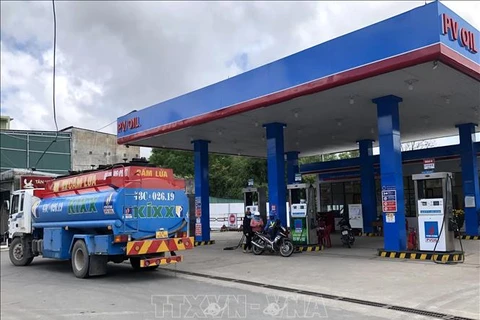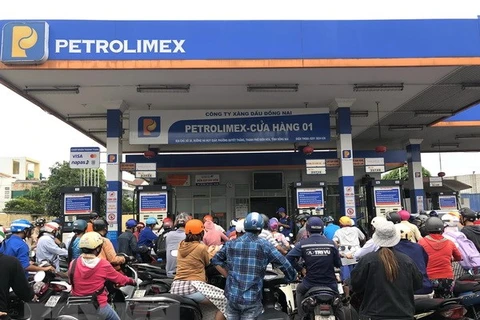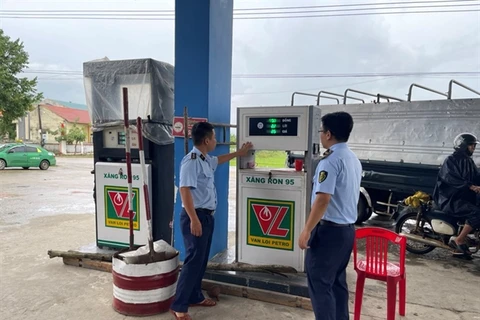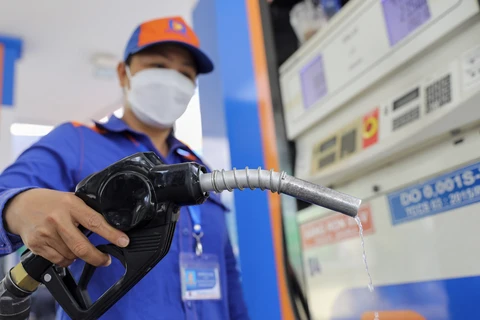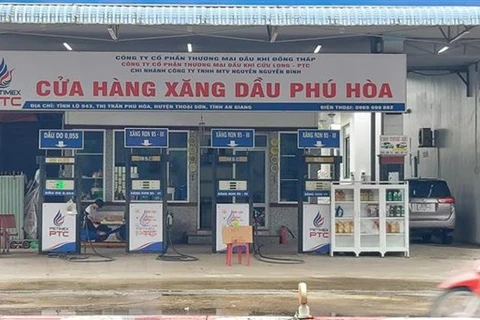 Minister of Industry and Trade Nguyen Hong Dien speaks at the National Assembly’s session on the 2022 socio-economic performance and the 2023 development plan on October 28. (Photo: VNA)
Minister of Industry and Trade Nguyen Hong Dien speaks at the National Assembly’s session on the 2022 socio-economic performance and the 2023 development plan on October 28. (Photo: VNA) At the National Assembly’s session on 2022 socio-economic performance and the 2023 development plan on October 28, Minister of Industry and Trade Nguyen Hong Dien said the move was a prerequisite for petroleum businesses to maintain their business and prevent large-scale disruption nationwide.
In recent days, many petrol stations in the southern region have closed, partly because of losses, and partly because of supply shortages.
Ta Thi Yen, a deputy from northern Dien Bien province, said according to the national energy security strategy, there are two refineries of Nghi Son and Binh Son, which guarantee up to 70-80% of output, and the country only has to import the remaining 20%.
However, the shortage of petrol supply still occurred at many petrol stations in Ho Chi Minh City. She asked for an explanation of the cause of the incident and the changes that should be made for improvement.
Explaining the issue, Dien said according to current regulations, petroleum management has been assigned to seven ministries and 63 cities and provinces. So, it is necessary to closely coordinate among these ministries and authorities to manage it well.
He said the ministry has been assigned to manage petroleum supply and demand and operate the system. But in order to do that, the ministry needed the banking industry’s support in credit lending and guarantees for petrol enterprises.
In order to help petroleum enterprises to survive and sustain their dealer and retail system, the sector needed to guide and update the cost of sources and other actual expenses in the calculation of the petroleum base prices.
In this way, enterprises could survive and handle their dealer and retail systems during difficult times.
In addition, Dien said that there should also be a role of local authorities in licensing and managing nearly 17,000 agents and retailers.
Affirming that the petroleum market is basically stable, he said Vietnam is always among the countries with the lowest retail prices in the region and the world.
He described the insufficient petroleum supply incident as "regrettable and unusual".
Pointing out the reasons, Dien said apart from global impacts on petroleum prices, petroleum enterprises have difficulties in accessing capital, guaranteeing bank credit, and loan conditions while foreign exchange rates increased.
In the context of scarcity of goods, many costs are incurred, causing losses for enterprises and disruption to the domestic petroleum supply.
In addition to the impacts of natural disasters that slowed down freight during the past two months, another reason, according to Dien, is the recent crackdown on a number of petrol smuggling rings with large quantities, affecting the distribution of petroleum in certain areas.
Dien said in the southern region, there are 146 petroleum distributors, accounting for 44% of the total. However, the ministry’s survey showed that many dealers didn’t purchase petrol although they had signed contracts, leading to the loss of buying opportunities when the market fluctuated.
This has also contributed to the disruption of the petrol supply in this region.
Regarding solutions, Dien said the ministry would direct petrol and oil enterprises to share sources of supply, promptly provide aid to areas in need of petroleum, and allocate and increase production and import in order to ensure market supply in all situations.
It would also coordinate with authorities to strengthen the supervision of petrol enterprises and handle violations, including permanently withdrawing the licences of violators.
It would help remove difficulties in accessing capital as well as review and update the new cost in the formula for calculating petroleum’s base prices. Currently, businesses are in dire need of loosening the loan ceiling, preferential interest rates, supporting liquidity conditions to be able to maintain their operations, he said.
The ministry would advise all levels to use taxes, fees, stabilisation funds, and welfare policies when necessary to regulate retail prices in line with the world’s market fluctuations. It would also deploy petroleum distribution management software to ensure accuracy and transparency.
Management policies in the field of petroleum production, business and reserve would be amended and supplemented in order to remove the overlaps in management and operation, he added./.
VNA
